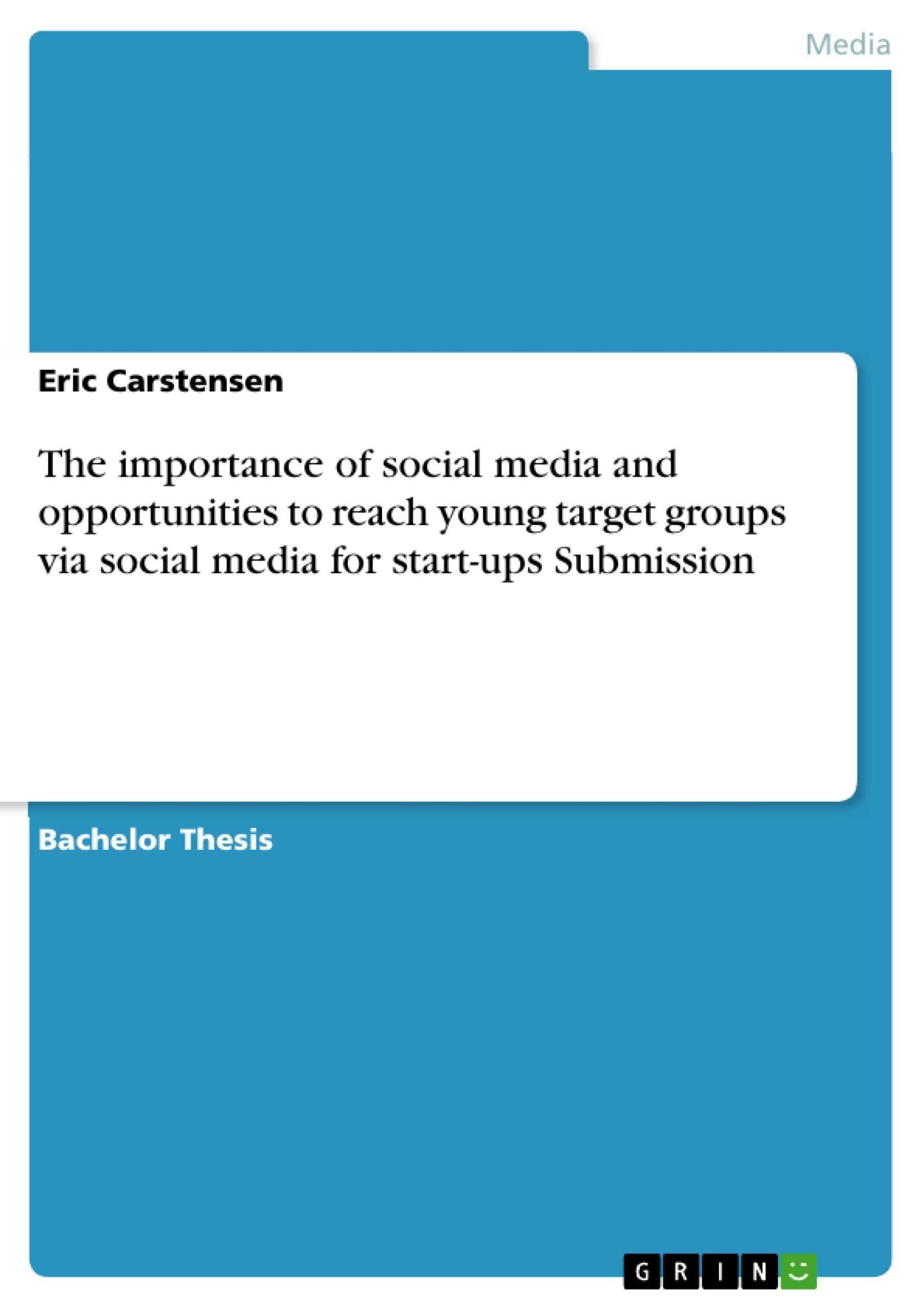How can new companies and start-ups use social media in the most effective way to gain the greatest possible advantage in terms of profit and customer loyalty?
Are customers influenced by social media and to what extent can start-up companies benefit from these influences?
This thesis shows how start-up companies can build their reach through the targeted use of social media. It will be compared if targeted online marketing gives companies an advantage over companies that do not use social-media-marketing. For this research, online surveys with young people, age 18 to 25 were conducted.
Through this help new companies can learn how to gain an advantage over other companies, using targeted marketing to the company's target audience. For this work, young people are interviewed via online surveys and this also benefits companies that have young people as a target group.
Social media is spreading and is much more influential today than five years ago. The popularity and number of visits to social-media websites is changing constantly. For companies this can result in a big advantage if they advertise on current used social media platforms. Companies always must be up to date (Kapoor, 2017).
Current primary research results are used to ascertain which websites are most frequently visited by young people and which websites have the greatest influence on their buying behaviour.
Companies can differentiate themselves from their competitors by using social media.
By investigating social media strategies, the bachelor thesis summarizes both the stock of literature and the opportunities to gain competitive advantage through social media.
The thesis is mainly aimed at young companies that do not have many years of experience in social media like large companies. In addition, it gives them a huge competitive advantage, possibly advantage over long-standing companies that use outdated social media techniques.
By analysing the mentioned aspects, the overall focus lies on the following statement:
How can start-up company reach more young customers with a specific use of social media to have a successful start in the business sector and build a relationship with the costumer in the long term?
Inhaltsverzeichnis (Table of Contents)
- Chapter I: The Overview
- Introduction
- 1.1 Research Aim
- 1.2 Research Objectives
- 1.3 Research Questions
- 1.4 Primary Research:
- 1.5 Research outlook
- Chapter II: Literature Review
- 2. Literature Review
- 2.1 Social Media
- 2.2 Online Marketing
- 2.3 Advantages of social media
- 2.4 Activities of social media users
- 2.5 Choosing the right social media platform
- 2.6 How companies can use social media marketing to gain advantages
- 2.7 Advice for Small Business
- Chapter III: Methodology
- Introduction
- 3. Research Methodology
- 3.1 Research model
- 3.2 Research Strategy
- 3.3 Research choices
- Chapter IV: Result of the Empiring Findungs
- 4. Research Results and Discussion of the Empirical Findings
- 4.1 Advantages for companies through social media
- 4.2 Primary research results
- 4.3 Discussion of the interviews
- Chapter V: Discussion
- 5. Discussion
Zielsetzung und Themenschwerpunkte (Objectives and Key Themes)
This thesis aims to examine the impact of social media marketing on start-up companies and their ability to reach young target groups. The research analyzes how targeted online marketing strategies can provide an advantage for start-ups over companies that do not utilize social media.
- The role of social media in reaching young target groups.
- The advantages and disadvantages of social media marketing for start-ups.
- The effectiveness of targeted online marketing strategies in reaching specific demographics.
- The impact of social media on customer acquisition and brand building.
- The importance of staying up-to-date with social media trends and platforms.
Zusammenfassung der Kapitel (Chapter Summaries)
Chapter I: The Overview introduces the research topic and outlines the aim, objectives, and research questions of the thesis. It emphasizes the growing importance of social media marketing in the current economic environment and highlights the potential benefits for start-up companies.
Chapter II: Literature Review delves into the theoretical framework of social media marketing, exploring key concepts and existing research findings. This chapter covers topics like social media platforms, online marketing strategies, advantages of social media, activities of social media users, and advice for small businesses.
Chapter III: Methodology outlines the research approach and methods used in this study. This chapter describes the research model, strategy, and specific choices made to gather and analyze data.
Chapter IV: Result of the Empiring Findungs presents the findings and discussion of the empirical research conducted. This chapter focuses on the advantages of social media for companies, primary research results, and a detailed analysis of the interviews.
Schlüsselwörter (Keywords)
The primary keywords and focus topics of this research are: social media marketing, start-up companies, young target groups, online advertising, targeted marketing, customer acquisition, brand building, social media platforms, primary research, online surveys, empirical findings, and competitive advantage.
- Quote paper
- Eric Carstensen (Author), 2020, The importance of social media and opportunities to reach young target groups via social media for start-ups Submission, Munich, GRIN Verlag, https://www.grin.com/document/1472952



